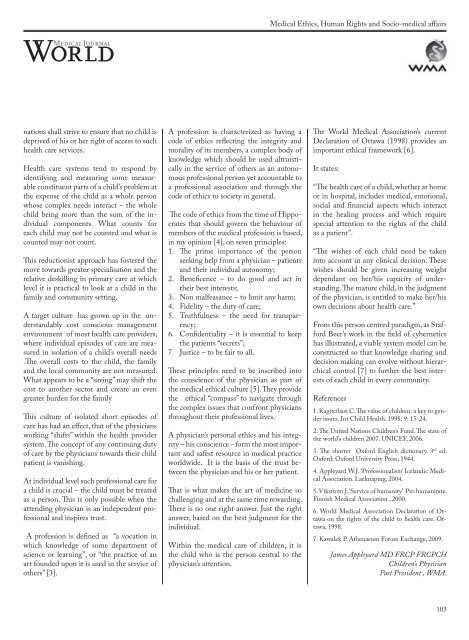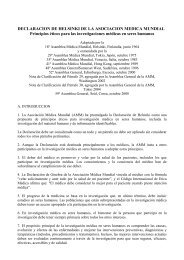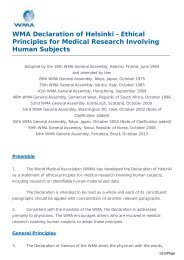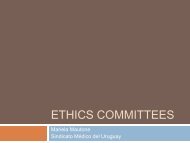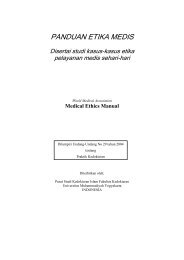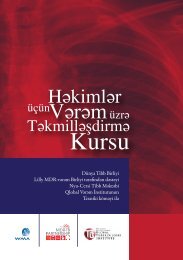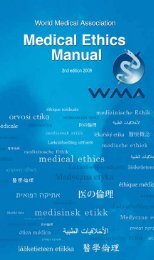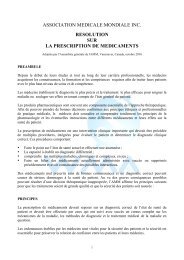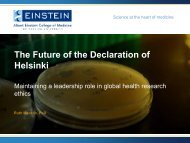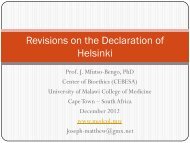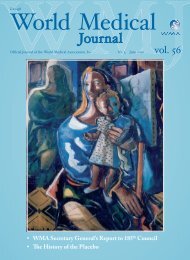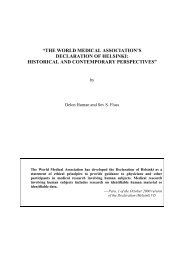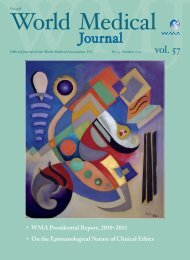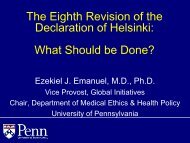wma 7-2.indd - World Medical Association
wma 7-2.indd - World Medical Association
wma 7-2.indd - World Medical Association
You also want an ePaper? Increase the reach of your titles
YUMPU automatically turns print PDFs into web optimized ePapers that Google loves.
<strong>Medical</strong> Ethics, Human Rights and Socio-medical affairs<br />
nations shall strive to ensure that no child is<br />
deprived of his or her right of access to such<br />
health care services.<br />
Health care systems tend to respond by<br />
identifying and measuring some measurable<br />
constituent parts of a child’s problem at<br />
the expense of the child as a whole person<br />
whose complex needs interact – the whole<br />
child being more than the sum of the individual<br />
components. What counts for<br />
each child may not be counted and what is<br />
counted may not count.<br />
This reductionist approach has fostered the<br />
move towards greater specialisation and the<br />
relative deskilling in primary care at which<br />
level it is practical to look at a child in the<br />
family and community setting.<br />
A target culture has grown up in the understandably<br />
cost conscious management<br />
environment of most health care providers,<br />
where individual episodes of care are measured<br />
in isolation of a child’s overall needs<br />
.The overall costs to the child, the family<br />
and the local community are not measured.<br />
What appears to be a “saving” may shift the<br />
cost to another sector and create an even<br />
greater burden for the family<br />
This culture of isolated short episodes of<br />
care has had an effect, that of the physicians<br />
working “shifts” within the health provider<br />
system. The concept of any continuing duty<br />
of care by the physicians towards their child<br />
patient is vanishing.<br />
At individual level such professional care for<br />
a child is crucial – the child must be treated<br />
as a person. This is only possible when the<br />
attending physician is an independent professional<br />
and inspires trust.<br />
A profession is defined as “a vocation in<br />
which knowledge of some department of<br />
science or learning”, or “the practice of an<br />
art founded upon it is used in the service of<br />
others” [3].<br />
A profession is characterized as having a<br />
code of ethics reflecting the integrity and<br />
morality of its members, a complex body of<br />
knowledge which should be used altruistically<br />
in the service of others as an autonomous<br />
professional person yet accountable to<br />
a professional association and through the<br />
code of ethics to society in general.<br />
The code of ethics from the time of Hippocrates<br />
that should govern the behaviour of<br />
members of the medical profession is based,<br />
in my opinion [4], on seven principles:<br />
1. The prime importance of the person<br />
seeking help from a physician – patients<br />
and their individual autonomy;<br />
2. Beneficence – to do good and act in<br />
their best interests;<br />
3. Non malfeasance – to limit any harm;<br />
4. Fidelity – the duty of care;<br />
5. Truthfulness – the need for transparency;<br />
6. Confidentiality – it is essential to keep<br />
the patients “secrets”;<br />
7. Justice – to be fair to all.<br />
These principles need to be inscribed into<br />
the conscience of the physician as part of<br />
the medical ethical culture [5]. They provide<br />
the ethical “compass” to navigate through<br />
the complex issues that confront physicians<br />
throughout their professional lives.<br />
A physician’s personal ethics and his integrity<br />
– his conscience - form the most important<br />
and safest resource in medical practice<br />
worldwide. It is the basis of the trust between<br />
the physician and his or her patient.<br />
That is what makes the art of medicine so<br />
challenging and at the same time rewarding.<br />
There is no one right answer. Just the right<br />
answer, based on the best judgment for the<br />
individual.<br />
Within the medical care of children, it is<br />
the child who is the person central to the<br />
physician’s attention.<br />
The <strong>World</strong> <strong>Medical</strong> <strong>Association</strong>’s current<br />
Declaration of Ottawa (1998) provides an<br />
important ethical framework [6].<br />
It states:<br />
“The health care of a child, whether at home<br />
or in hospital, includes medical, emotional,<br />
social and financial aspects which interact<br />
in the healing process and which require<br />
special attention to the rights of the child<br />
as a patient”.<br />
“The wishes of each child need be taken<br />
into account in any clinical decision. These<br />
wishes should be given increasing weight<br />
dependant on her/his capacity of understanding.<br />
The mature child, in the judgment<br />
of the physician, is entitled to make her/his<br />
own decisions about health care.”<br />
From this person centred paradigm, as Stafford<br />
Beer’s work in the field of cybernetics<br />
has illustrated, a viable system model can be<br />
constructed so that knowledge sharing and<br />
decision making can evolve without hierarchical<br />
control [7] to further the best interests<br />
of each child in every community.<br />
References<br />
1. Kagitcibasi C. The value of children: a key to gender<br />
issues. Int Child Health. 1998; 9: 15-24.<br />
2. The United Nations Children’s Fund. The state of<br />
the world’s children 2007. UNICEF, 2006.<br />
3. The shorter Oxford English dictionary. 3 rd ed.<br />
Oxford: Oxford University Press, 1944.<br />
4. Appleyard W.J. ‘Professionalism’ Icelandic <strong>Medical</strong><br />
<strong>Association</strong>. Laeknaping, 2004.<br />
5. Vikstrom J. ‘Service of humanity’ Pro humanitate.<br />
Finnish <strong>Medical</strong> <strong>Association</strong> , 2000.<br />
6. <strong>World</strong> <strong>Medical</strong> <strong>Association</strong> Declaration of Ottawa<br />
on the rights of the child to health care. Ottawa,<br />
1998.<br />
7. Kawalek P. Athenaeum Forum Exchange, 2009.<br />
James Appleyard MD FRCP FRCPCH<br />
Children’s Physician<br />
Past President , WMA.<br />
103


